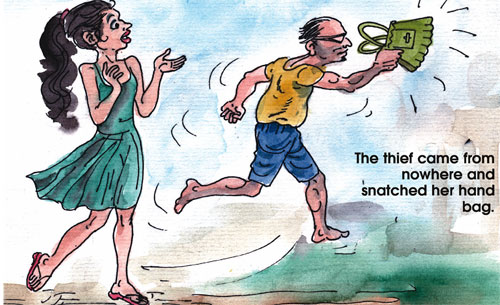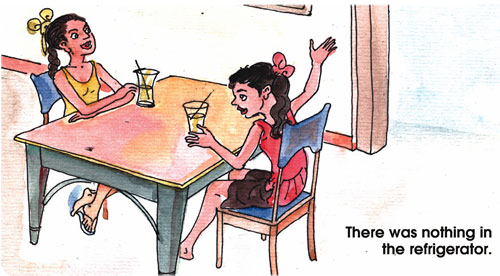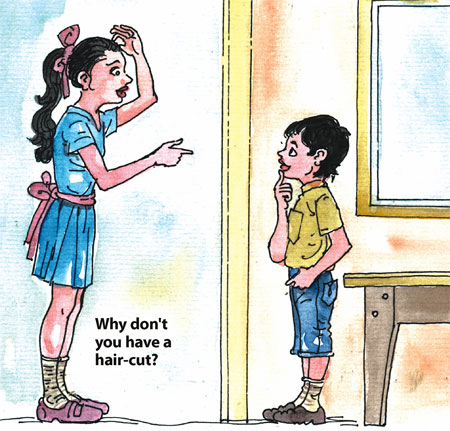|

by R. S. Karunaratne
Negatives with 'Nobody' and 'Never'
We make negative sentences with 'nobody', 'nothing', 'nowhere',
'never', 'no' and 'hardly.' With these words, we do not use 'do not',
'does not' or 'did not.'
Nobody
"Nobody loves me," the child said.
There is nobody at home.
Nobody knows what happened to the bag containing Rs 100,000.

Nobody came for my birthday party.
Nobody knows how to operate this machine.
Nothing
"I have nothing to declare except my genius," said Oscar Wilde.
She ate nothing in the morning.
Nothing is impossible if you have the will power.
The students did nothing during the first period.
There was nothing in the refrigerator.
Nowhere
I looked for the dog but it was nowhere to be seen.
These young men have nowhere to go.
The thief came from nowhere and snatched her hand bag.
I'm trying to convince him, but I'm getting nowhere.
The little girl was nowhere to be found.
Never
I have never been to Germany.
I will never forget you.
Wars never solve anything.
She never knew that I was a police officer.
It's never too late to learn.
No
There are no drawers in these tables.
I have no mobile phone.
There is no way of contacting him.
A: Did you attend your friend's birthday party?
B: No.
Their house is no bigger than ours.
Hardly
I ate hardly anything at the wedding.
We hardly ever go to parties.
You can hardly expect a pay rise.
It's hardly my fault.
There were hardly any ships in the harbour.
Activity
Put the words in order and check your answers with the key. Use
punctuation marks where necessary.

1. Amanda / writes / me / never / to
......................................
2. likes / said / nobody / the / boy / me
......................................
3. hardly / I / him / can / understand
.......................................
4. me / to / writes / never / brother / my
........................................
5. stranger / the / said / money / no / got / have / I
.........................................
6. today / nothing / sold / I / said / the / vendor
..........................................
7. early / up / gets / never / grandfather / my
...........................................
8. the/ said / driver / could / I / hardly / the/ see / road
...........................................
9. my / seen / cat / nowhere / was / be / to
............................................
10. Anuradha / nobody / me / telephone / today / said
.............................................
************
Key:
1. Amanda never writes to me.
2. "Nobody likes me," said the boy.
3. I can hardly understand him.
4. My brother never writes to me.
5. "I have got no money," said the stranger.
6. "I sold nothing today," said the vendor.
7. My grandfather never gets up early.
8. "I could hardly see the road," said the driver.
9. My cat was nowhere to be seen.
10. "Nobody telephoned me today," said Anuradha.
************
Match words and meanings
Here's an exciting way to enrich your vocabulary. Match the words in
Column 'A' with their meanings in Column 'B' and check your answers with
the key. The first has been done for you.
[Column A]
E 1. chit-chat
... 2. chivalrous
... 3. choc-ice
... 4. chock
... 5. chock-a-block
... 6. chock-full
... 7. chocoholic
... 8. choleric
... 9. chop
.. 10. chopper
.. 11. chore
.. 12. choreography
.. 13. chronicle
.. 14. chronometer
.. 15. chubby
.. 16. chuck
.. 17. chuckle
.. 18. chug
.. 19. chum
.. 20. chunk
.. 21. churlish
.. 22. churn
.. 23. cider
.. 24. cinder
.. 25. cinematic
[Column B]
A. full of people or things
B. a block of wood
C. a small block of ice cream
D. kind towards women
E. informal conversation
F. an alcoholic drink made from apples
G. to mix a liquid with great force
H. rude and unfriendly
I. a roughly cut piece
J. a friend
K. to make the sound of an engine
L. to laugh quietly
M. to throw something carelessly
N. fat in a pleasant way
O. equipment to measure time accurately
P. a written record of historical events
Q. the skill of combining movements into dances
R. unpleasant work
S. a helicopter
T. to cut something into pieces
U. very angry
V. one who loves chocolate
W. completely full
X. a small piece of partly burnt coal
Y. relating to the cinema
***********
Key:
2. D 3. C 4. B 5. A 6. W 7. V 8. U 9. T 10. S 11. R 12. Q 13. P 14. O
15. N 16. M 17. L 18. K 19. J 20. I 21. H 22. G 23. F 24. X 25. Y
***********
Starters:
Suggestions, offers and invitations
There are various ways of making suggestions, offers and invitations.
Let us study them separately.
Suggestions
We use "Shall we ..." to make a suggestion.
Shall we dance?
Shall we go for a walk?

Shall we play hide and seek?
Shall we remain silent for three minutes?
Shall we run a race?
We also use "Let's ..." to make a suggestion.
Let's listen to some classical music.
Let's wait here until the procession is over.
Let's vote for the XYZ Party.
Let's do our studies without talking.
Let us have some tea.
Sometimes we use "We could ..." to make a suggestion.
We could watch the match on television.
We could invite a few more friends for your birthday party.
We could make some arrangements to accommodate you here.
We could help the poor boy in his studies.
We could walk from here to school.
We can make a suggestion with "Why don't ...."
Why don't we have a look around the new house?
Why don't you have a hair-cut?
Why don't we invite them for the New Year party?
Why don't we collect some money for the building fund?
Why don't we find a place to study?
To ask for a suggestion, we use "Shall, should" or "Can."
Where shall we go for lunch?
Where should I park my car?
Where can I sit?
Where shall we pose for a group photograph?
What should I do now?
How can I get through to Doreen?
Offers
We use "Will" or "Can" to offer to do something.
I'll carry those heavy bags.
We can give you a lift.
We'll wait for you at the airport.
I can clean the kitchen for you.
We'll vote for you.
We can use question forms with "Shall" or "Can" to make an offer.
Shall I pay the bill?
Can I post your letters?
Shall we wait for him?
Can I help you?
Shall I hail a taxi?
When we offer food or drink, we use "Would like."
Would you like to have a drink?
Would you have some ice cream?
Would you like to have lunch with me?
Would anyone like to have tea?
Would you like one of these bananas?
To make an offer we use "Will / Won't you have ...?"
Will you have a cool drink?
Won't you like to have some ice cream?
Will you order anything you like?
Won't you have some coffee?
Will you have a piece of cake?
In informal situations we can use the imperative.
Have a cup of coffee.
Take a banana.
Have a piece of cake.
Have some ice cream.
Drink some orange juice.
Invitations
We use "Would you like to ...?" to make an invitation.
Would you like to have some tea with us?
Would you like to visit the zoo?
Would you like to stay the night?
Would you like to join us for coffee?
Would you like to have a single room?
In informal speech we use the imperative.
Come and have tea with us.
Sit here.
Post this letter, please.
Wait for me, I'll be back in a minute.
Have a sausage.
Quiz on idioms
An idiom is a special kind of phrase. It is a group of words which
have a different meaning when used together from the one it would have
if the meaning of each word were taken individually. Tick the meaning of
each idiom in bold type and check your answers with the key.
1. If something goes begging ...
(a) it is available but nobody seems to want it
(b) it is not available but everybody seems to want it
(c) if you ask for something, you will get it
2. If something rings a bell ...
(a) it annoys you
(b) it is not familiar to you
(c) it is slightly familiar to you
3. If an alarm bell starts to ring ...
(a) people know that a procession is on its way
(b) people begin to be aware of a problem
(c) people come to know that an important visitor is coming
4. If you have a bellyful of something ...
(a) you find it very boring
(b) you have eaten too much
(c) you suffer from indigestion
5. If a company goes belly-up ...
(a) it is expanding
(b) it has no money to pay its debts
(c) it is running at a profit
6. If you tighten your belt ...
(a) you have to spend less
(b) you have to spend more
(c) you have to earn and spend
7. If you give somebody the benefit of the doubt ...
(a) you remain silent
(b) you don't believe what they say
(c) you believe what they say
8. If you give somebody a wide berth ...
(a) you deliberately avoid them
(b) you welcome them with open arms
(c) you hate them
9. If somebody hedges their bets ...
(a) they are clueless
(b) they willingly make a decision
(c) they avoid making a decision
10. If you are given a clean bill of health ...
(a) you are fit and healthy
(b) you are unfit and ill
(c) you have to pay a huge hospital bill
************
Key:
1. (a) 2. (c) 3. (b) 4. (a) 5. (b) 6. (a) 7. (c) 8. (a) 9. (c) 10. (a)
************ |

